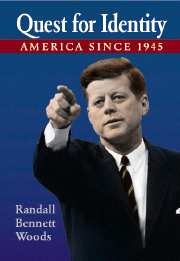Book contents
- Frontmatter
- Contents
- Preface
- 1 The Republic in Transition
- 2 The Origins of the Cold War
- 3 Staying the Course
- 4 Containing Communism and Managing the Military–Industrial Complex
- 5 Capitalism and Conformity
- 6 Liberalism Reborn
- 7 The Wages of Globalism
- 8 The Dividing of America
- 9 Realpolitik or Imperialism? Nixon, Kissinger, and American Foreign Policy
- 10 The Limits of Expediency
- 11 From Confidence to Anxiety
- 12 Governing in a Malaise
- 13 The Culture of Narcissism
- 14 In Search of Balance
- Index
8 - The Dividing of America
Vietnam, Black Power, the Counterculture, and the Election of 1968
Published online by Cambridge University Press: 05 June 2012
- Frontmatter
- Contents
- Preface
- 1 The Republic in Transition
- 2 The Origins of the Cold War
- 3 Staying the Course
- 4 Containing Communism and Managing the Military–Industrial Complex
- 5 Capitalism and Conformity
- 6 Liberalism Reborn
- 7 The Wages of Globalism
- 8 The Dividing of America
- 9 Realpolitik or Imperialism? Nixon, Kissinger, and American Foreign Policy
- 10 The Limits of Expediency
- 11 From Confidence to Anxiety
- 12 Governing in a Malaise
- 13 The Culture of Narcissism
- 14 In Search of Balance
- Index
Summary
Fundamental divisions in American society and basic flaws in the nation's approach to international affairs came to the surface during the 1960s and roiled the political and social waters. The decade had begun on a hopeful note with the election of a young, seemingly idealistic president by a populace ready for change. But John F. Kennedy's victory was by the barest of margins. A substantial portion of the American people were fundamentally conservative, determined to cling to the mores and folkways that had so long prevailed. The illusion of consensus that Kennedy's triumph and the enactment of Lyndon B. Johnson's Great Society programs created was just that, an illusion. The great “silent majority,” a term Richard Nixon would coin in 1970, was white, lower middle class, and determined to protect its hard-won social and economic gains. They distrusted government, seeing it as an agency of unwanted racial integration and taxation, and they believed that minority groups ought not to disturb social tranquility in their various quests. Indeed, many viewed women, blacks, and Hispanics as having selfish special interests. They believed that the only good communist was a dead one, that all Americans ought to be Christians, and that government existed to help them to do what they wanted to do. This conservatism was deepened and broadened by the increasingly strident posture taken by the disadvantaged and by opponents of the war in Southeast Asia.
- Type
- Chapter
- Information
- Quest for IdentityAmerica since 1945, pp. 248 - 280Publisher: Cambridge University PressPrint publication year: 2005



